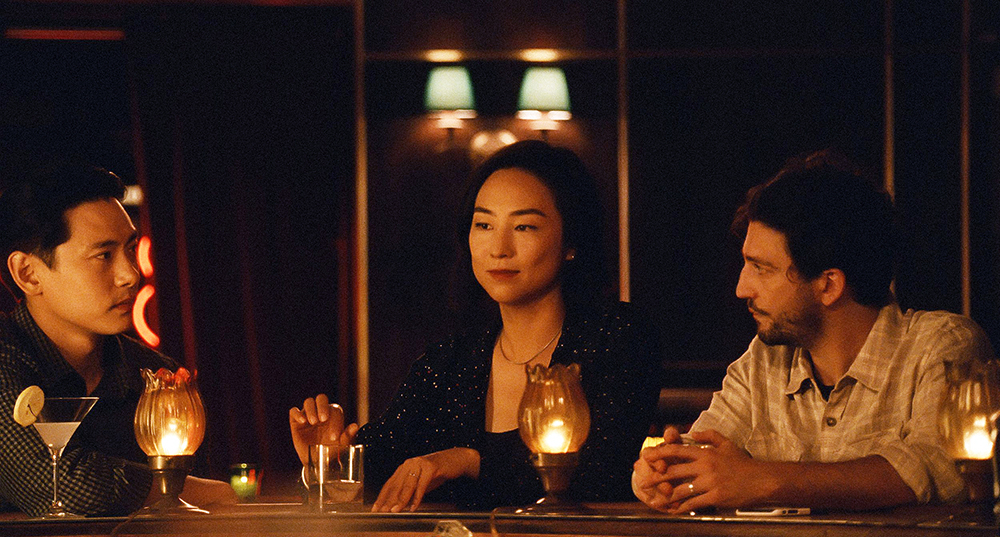Director Celine Song’s film debut was 2023’s Past Lives. In it, a pair of childhood friends, Na Young and Hae Sung, are just getting old enough to feel the first stirrings of young love when Na Young’s family immigrates to the United States. A decade later, Na Young, now known as Nora Moon, gets a message from a friend that Hae Sung is looking for her on Facebook. They connect and have increasingly intimate conversations on Skype before drifting apart again. Then another decade passes, and Hae Sung is going through a bad breakup. He decides to visit Nora in New York City — but Nora has a serious boyfriend now, and the embers of love that were kindled 20 years before are slowly snuffed out.
Past Lives was nominated for a Best Picture Academy Award, ultimately losing out to the Oppenheimer juggernaut. Song’s strengths as a playwright and radical theater director (she once mounted a virtual production of Chekhov’s The Seagull in The Sims 4) were evident in the humanity she brought to the screen. The film was a compelling character study of three people navigating an impossible situation. There were no good girls, no bad boys, no high stakes, just the low-key drama of everyday life. Its unhurried editing and patient cinematography marked it as the most prominent of the “slow cinema” movement which emerged during the pandemic era.

To follow up on her brilliant debut, Song has written, co-produced, and directed Materialists. It’s another film about an unlikely love triangle, but this one turns out very differently.
Materialists opens in the Paleolithic period, with a man deciding to cut some flowers to woo his cave-bae. The presumed inventor of the florist industry made the right call — she loves the flowers and is equally impressed by his bulging bag of well-crafted stone tools. The two settle down to make their rock shelter a cave home.
Then, in the rom-com equivalent of Kubrick’s three-million-year cut from 2001: A Space Odyssey, we are in present-day New York City with Lucy (Dakota Johnson), who is herself a bit of an anachronism — a professional matchmaker in the 21st century. Her company, Adore Inc., specializes in busy, well-heeled professionals who have little time to waste on the dating scene. But being a human dating app is no picnic. Lucy has a problem client named Sophie (Zoë Winters) who has gone on one bad first date after another. Her feelings of discouragement don’t last long, though. When she returns to the office, her colleagues throw her a party in honor of the ninth successful wedding resulting from her matchmaking skills.
But a client’s wedding means Lucy has to work weekends. After all, where better to get new matchmaking business than an extravagant wedding full of insecure, single rich people? As she’s handing out cards to bridesmaids and talking the bride down from a last-minute bout of cold feet, she attracts the attention of Harry (Pedro Pascal). Harry is what the matchmaking industry calls a “unicorn.” First of all, he’s a super-rich private equity bro. Second, he’s over six feet tall. And third, since he’s played by Pedro Pascal, he’s devastatingly handsome. He would be a good get for Lucy’s portfolio, but he’s not interested in signing up for her professional services. He’s interested in her.
The problem is, Lucy is a cold fish. Her years as fire control in the dating trenches have made her hard and cynical. She can’t see past a guy’s demographic profile. “It’s like working at the morgue or an insurance company,” she tells Harry.
Lucy’s trying to keep her life simple until the perfect guy — meaning, a rich guy — comes along. But another complication arises, in the person of John (Chris Evans), a cater-waiter working the wedding. As it turns out, John is Lucy’s ex. They met when they were both aspiring actors, and dated for five years until Lucy decided to give up the artist’s life and get a rich husband. John, meanwhile, is still at it, still living with roommates and auditioning for plays at age 37. But one look from his smoldering eyes and her carefully constructed emotional defenses melt away. In true rom-com fashion, Lucy has to choose between the perfect man who “checks all of her boxes” and an imperfect man who she can’t help but love.
It’s probably not fair to judge Materialists as a rom-com. It’s been low-key billed as one, but the truth is, it’s not very funny, and I’m not sure laughs were the director’s goal. It certainly has its moments, like the shock on John’s face when Lucy shows up to the premiere of his new play with Harry in tow, and a luminous outdoor wedding John and Lucy crash in upstate New York. Evans, freed from daily workouts necessary to play Captain America, shows once again that he’s got leading man acting chops to spare. Pascal’s role is to melt the ice queen but not drum up too much sympathy, and he’s got just enough control for the job.
The problem is Dakota Johnson. Sure, she can rock the post-coital dress-shirt-and-panties look better than anyone working, but about halfway through Materialists, I had a revelation: She’s a terrible actor. In the early going, when Lucy’s got her working-with-clients game face on, Johnson’s laconic monotone makes sense. But as the story goes on, and Lucy’s emotions are supposed to get the better of her, Johnson’s flat affect never changes. It’s not just that there’s no chemistry between Johnson and either Pascal or Evans, it’s that she has no chemistry with any human beings. This is most evident as the film moseys to what passes for a climax, with John and Lucy going on a road trip in his beat-up Volvo. Song’s dialogue can be stilted (“I do pot at parties!”), but the charismatic Evans can sell it. Johnson, on the other hand, looks deeply annoyed that she has to show up and act. With a better lead, Materialists might have had a chance to make a statement about late capitalist love. But with Johnson droning on for an excruciating 117 minutes, it’s a slowly sinking ship. At least Titanic was romantic.
Materialists
Now playing
Multiple locations

